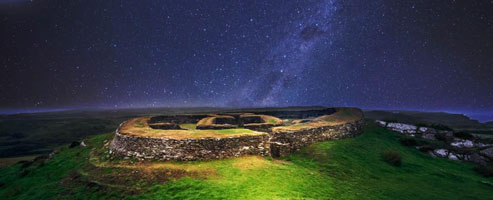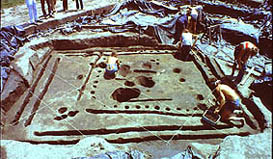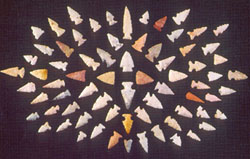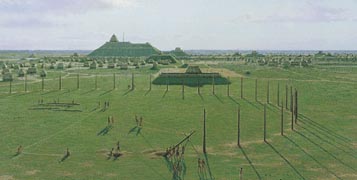Overview
This course provides an introduction to theory and methods in archaeological research, data collection, and analysis. The objective is to familiarize you with the strategies that are employed in the investigation of archaeological remains and how these strategies further the aims of an anthropological archaeology. Grades will be based on two in-class exams, two section quizzes, and weekly assignments. Learn more about the course structure and opportunities in the general syllabus guidelines.
I have created a course web page for Introduction to Archaeology using the University's Canvas program. You can access the course web page by logging onto the Canvas system, which will display all existing web pages for your courses. Choose Anth. 220 from the display list and you can access the course syllabus, assignments, lecture notes and illustrations, extra credit opportunities, practice quizzes, and other online class resources.

Course Requirements and PoliciesExams, Quizzes, and Assignments
Your grade will be based on your performance on 2 in-class exams, 2 section quizzes, and 10 discussion section homework/exercises:
| Graded Component | % of Course Grade | Schedule |
| Section Assignments & Labs | 25 | Weekly |
| Quiz 1 | 10 | Sept. 26 |
| Midterm Examination | 25 | Oct. 20 |
| Quiz 2 | 10 | Nov. 14 |
| Final Examination | 30 | Dec. 10 |
When taking exams and quizzes and completing written assignments, you will be responsible for knowing the concepts and terms discussed in the assigned readings, in the films shown in class, and in the topics covered in lectures, discussion sections, handouts, and web page or power point summaries. When completing assignments, be careful that you do not plagiarize the works of another; that is, do not present the work or words of another person in a verbatim manner as your own. Consult the UIUC student code for more guidelines on academic integrity. Assignments handed in late will lose 10% of the possible credit after the class in which they are due, and 10% more for each subsequent day late. No make-ups are provided for missed exams, quizzes, or assignments in the absence of documented and legitimate medical or family emergencies.
Attendance and Participation
Your regular attendance and active participation are of central importance for this course to provide you with both a fun and satisfying educational experience. Good attendance, class preparation, and note-taking practices will be very important for your ability to perform well, particularly on exams and quizzes. You can also obtain extra credit by attending a talk or museum exhibit related to archaeology and submitting a two-page essay on the subject in your Discussion Section in accordance with the related guidelines.

Required Texts
 Archaeology: Theories, Methods, and Practice, by Colin Renfrew, Paul Bahn, and Elizabeth DeMarrais (Thames & Hudson, 9th ed. 2024). This text is available at the University bookstores and can also be obtained from other vendors of your choosing. Archaeology: Theories, Methods, and Practice, by Colin Renfrew, Paul Bahn, and Elizabeth DeMarrais (Thames & Hudson, 9th ed. 2024). This text is available at the University bookstores and can also be obtained from other vendors of your choosing.
 Other required or suggested readings may consist of short articles or text excerpts that provide additional information related to the subjects we are covering in our main textbook. These articles will be available online in the course web page on Canvas. Other required or suggested readings may consist of short articles or text excerpts that provide additional information related to the subjects we are covering in our main textbook. These articles will be available online in the course web page on Canvas.

Class Meeting Times and Locations:
The class meets as an entire group on Mondays and Wednesdays from 11:00am to 11:50am in Room 329 Davenport Hall. Chris Fennell's office hours, Room 296 Davenport Hall, are on Monday, 1pm to 3pm; please contact him by email to schedule a time, cfennell@illinois.edu. The Discussion Sections meet for one hour at 10am and 11am on Fridays in Room 116 of Davenport Hall, and are hosted by Teaching Assistant Lydia Evans, a doctoral candidate with a focus on archaeology; office hours, Friday, 1pm to 3pm, Room 384 Davenport Hall; email lydiade2@illinois.edu.
Class Schedule and Readings:
Week 1. Aug. 25, 27 & 29. Overview & Introduction to Course
Introductory comments and overview of structure of course.
Readings: Renfrew, Bahn & DeMarrais Preface and Introduction.
Discussion section, Aug. 29: Organizational meeting.
Labor Day break! Sept. 1.
Week 2. Sept. 3 & 5. History of the Discipline; Archaeology as Anthropology
Readings: Renfrew, Bahn & DeMarrais Chapter 1.
Discussion section, Sept. 5: Video: Myths and the Moundbuilders; Archaeological Sequence Activity assigned.
 
Week 3. Sept. 8, 10 & 12. Archaeological Data and Contexts
Readings: Renfrew, Bahn & DeMarrais Chapter 2.
Discussion section, Sept. 12: Archaeological Sequence Activity discussion.
Week 4. Sept. 15, 17 & 19. Site Reconnaissance, Surveys & Excavations
Readings: Renfrew, Bahn & DeMarrais Chapter 3.
Discussion section, Sept. 19: Sampling Strategies.
Week 5. Sept. 22, 24 & 26. Advances in Archaeological Survey Methods; Quiz 1
Readings: Renfrew, Bahn & DeMarrais Chapter 3 (cont'd).
Discussion section, Sept. 26: Quiz 1.
 
Week 6. Sept. 29, Oct. 1 & 3 Dating and Chronologies
Readings: Renfrew, Bahn & DeMarrais Chapter 4.
Discussion section, Oct. 3: Construction Sequences.
Week 7. Oct. 6, 8 & 10. Archaeology of Social Complexity
Readings: Renfrew, Bahn & DeMarrais Chapter 5.
Discussion section, Oct. 10: Video: Secrets of China's Terracotta Warriors.
Week 8. Oct. 13, 15 & 17. Past Environments
Readings: Renfrew, Bahn & DeMarrais Chapter 6.
Discussion section, Oct. 17: Midterm Review.
Week 9. Oct. 20, 22 & 24. Subsistence and Diet; Midterm Exam
Midterm Exam, Oct. 20.
Readings: Renfrew, Bahn & DeMarrais Chapter 7.
Discussion section, Oct. 24: Past Environments.
Week 10. Oct. 27, 29 & 31. Technologies
Readings: Renfrew, Bahn & DeMarrais Chapter 8.
Discussion section, Oct. 31: Ceramic Technologies; Occaneechi Town Activity assigned.
Week 11. Nov. 3, 5 & 7. Trade & Exchange
Readings: Renfrew, Bahn & DeMarrais Chapter 9.
Discussion section, Nov. 7: Occaneechi Town Activity discussion.
Week 12. Nov. 10, 12 & 14. Ideology, Symbolism & Cognitive Approaches; Quiz 2
Readings: Renfrew, Bahn & DeMarrais Chapter 10.
Discussion section, Nov. 14: Quiz 2.
Week 13. Nov. 17, 19 & 21. Archaeology of People and Physiologies
Readings: Renfrew, Bahn & DeMarrais Chapter 11.
Discussion section, Nov. 21: Video: Iceman Murder Mystery.

Thanksgiving break! Nov. 22 to Nov. 30.
Week 14. Dec. 1, 3 & 5. Explanation and Interpretation in Archaeology
Readings: Renfrew, Bahn & DeMarrais Chapters 12 and 13.
Discussion section, Dec. 5: Heritage and Ethics.
Week 15. Dec. 8. Future of the Past & Who Owns the Past?
Readings: Renfrew, Bahn & DeMarrais Chapters 14 and 15.
Review for Final Exam.
Final Exam: Dec. 10.
Additional internet resources on anthropology and archaeology, which are suggested only and not required reading for this course, are available at:
http://faculty.las.illinois.edu/cfennell/bookmark2.html
Internet resources on the archaeology of craft and industry, which are suggested only and not required reading for this course, are available at:
http://faculty.las.illinois.edu/cfennell/IndustrialArchaeologyBook.html
Additional internet resources on African and African-American archaeology, cultures, and history, which are suggested only and not required reading for this course, are available at:
http://www.diaspora.illinois.edu/bookmark3.html

Last updated: August 21, 2025
|

